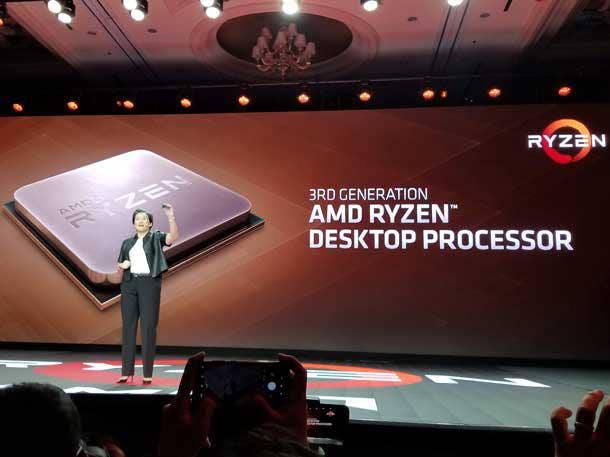AMD Fares Better Than Intel On Wall Street As It Steals CPU Market Share

AMD fared better on Wall Street than Intel with its latest financial quarter, largely thanks to strong sales of its client CPUs and data center GPUs, even though the company fell short on revenue expectations.
The Santa Clara, Calif.-based company's stock price was up as much as 8 percent in after-hours trading Tuesday after it posted $1.42 billion in revenue for the fourth quarter of 2018. Roughly 65 percent of those sales came from new products, including AMD's Ryzen client and EPYC data center CPUs, as well as its data center GPUs, CEO Lisa Su said during the company's earnings call.
"We reached an important milestone in our business in the quarter as our high-margin data center CPUs and GPUs accounted for a mid-teens percentage of overall revenue," Su said.
[Related: AMD: 7nm Ryzen's CES Debut Just The Start Of New Fight Against Intel]
AMD's fourth-quarter revenue was up 6 percent from the same period last year, was largely driven by its Computing and Graphics segment. The business unit, which grew 9 percent year-over-year to $986 million, was led primarily by strong sales of AMD's Ryzen processors. The company's data center GPUs helped contributed to sequential growth from the previous quarter.
With client processor shipments growing by more than 50 percent from the same period last year, the Computing and Graphics segment achieved its eighth straight quarter of year-over-year growth, Su said.
"We had our highest client computing revenue in more than four years, and we believe we gained client CPU unit share for the 5th straight quarters," she added.
The company's Enterprise, Embedded and Semi-Custom business, on the other hand, didn't fare as well, with $433 million in revenue and flat growth. Segment revenue for declined by 39 percent from the previous quarter largely due to lower sales from its semi-custom business, which dipped as customers Microsoft and Sony neared the end of their console cycles for Xbox One and PlayStation 4, respectively.
That decline was partially offset, however, by strong sales of the company's EPYC data center CPUs, which more than doubled in sales from the previous quarter. Su said that allowed the company to reach its goal of achieving mid-single digit server share by the end of 2018.
Su said she expects the company's 7-nanometer EPYC processor, which is code-named "Rome" and is due out mid-2019, will sell faster than AMD's current-generation server CPU because it shares a common infrastructure that will make it easy for customers to upgrade.
"We think that will help accelerate some of the adoption," the CEO said.
AMD's stock had taken a hit on Monday, sinking as much as 7 percent, after rival Nvidia slashed its sales forecast for the most recent quarter due to lower demand for GPUs in both the client and server markets — two areas in which the companies compete.
Intel, on the other hand, projected diminishing growth in data center growth, largely due to lower demand from cloud service providers and Chinese customers. The company, whose stock price sank more than 6 percent after posting its Q4 earnings last year, said it expects that growth would continue to slow for the first half of 2019 due to macroeconomic concerns.
But the company escaped shareholder scrutiny with its latest earnings, with AMD forecasting that its 2019 revenue will grow in the high single digits, higher than the 6 percent Wall Street analysts were expecting. While the company's Q4 revenue missed Wall Street's target by $20 million, its net earnings of 8 cents per share for the previous quarter was in-line with analyst expectations.
Su said that while a larger channel inventory for its client GPUs and macroeconomic uncertainties led to a cautious forecast for the first three months of 2019, the company believes its CPUs for client and data center, as well as its data center GPUs, will help it continue to gain market share throughout the year.
"As we enter 2019, we are prepared to launch our strongest product portfolio ever," she said.